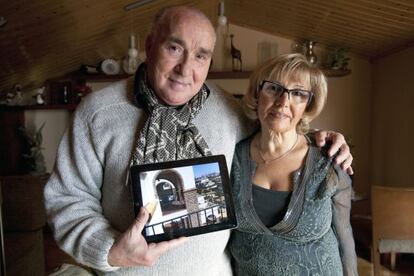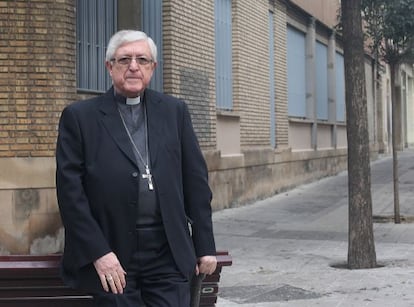Charity begins at home
Grassroots response to growing numbers of evictions has led to ordinary people stepping in to provide four walls and a roof for hard-up compatriots

Since the outbreak of the crisis in 2008 the number of over-indebted homeowners in Spain has risen to around 400,000. Spanish Banks - many of which are about to receive the first tranche of funds from a 100-billion-euro credit line from a European bailout - have repossessed 400,000 properties since 2008, though not all of those are residential. The trend is growing, with 50,000 repossessions in the first half of 2012, compared with 77,000 for the whole of 2011. In December, The government said it would suspend evictions for two years for vulnerable homeowners who can no longer pay back debt, including those with small children, the disabled and long-term unemployed.
In a country where a million homes lie empty - the legacy of a decade-long housing boom - the government has also said it will increase the amount of social housing available at low rents for people who have lost their homes.
But the wheels of the state move slowly. Responding to the growing crisis of homelessness, retirees with unoccupied summer houses, the Church, and even defunct property companies have come forward and are offering homes to people with no roof over their head.
I don't understand why we are rescuing banks instead of people"
Eulogio Carmona and Felisa García, a retired couple in their sixties who live in Mataró near Barcelona, have offered their 85-square meter apartment in a beachfront development in Almería. The property has a terrace, and sits amid manicured lawns with a communal swimming pool, padel courts, and comes with a Jacuzzi. The couple are not particularly well off, and two of their children are unemployed. But Eulogio, who used to run a debt-recovery business, says he knows "about what banks get up to." He left a message on his Twitter account offering the holiday home - "which we only used for a couple of weeks a year" - and was overwhelmed by the response. "We would expect the occupants to look after the place as though it were their own, and of course pay the running costs, which are probably about 125 euros a month," he says.
Property developer Antonio Gimeno says that he did well out of the construction boom, having built some 150,000 properties. "What matters now is to correct our mistakes and work together to find solutions to the problems we face," he says. He has invested five million euros in a foundation to administer a building with 25 empty new apartments in L'Alcudia, in Valencia. Occupants would pay 50 euros a month and be given a maximum of 10 years' stay. The local council has agreed not to charge Gimeno property tax on the building.
A couple in Bilbao, Isabel and José, are offering an 80-square-meter furnished apartment they own in Gijón on an annual contract: "Some of us are able to help relieve the suffering of so many families." They say 800 people have contacted them so far.

On December 7, Joan Piris, the bishop of Lleida, in Catalonia, met with members of the Mortgage Victims' Platform (PAH) and decided to offer part of the land occupied by a former seminary in the city to build low-cost housing. "I don't understand why we are rescuing banks instead of people," he says. Local building companies, architects, and construction material suppliers have already contacted him. A team of volunteers is to oversee the project. It is hoped that up to eight homes can be built. Carles Sanmartín, a local priest who works in the community, says rents would be set at around 200 euros a month: "In the face of such a serious crisis, we all have to do our bit. The response from volunteers has been very encouraging. People are waking up to what is going on around them."
Also in early December, José Manuel Pena, the spokesman for a local group campaigning against evictions in La Coruña, was contacted by an anonymous donor who wanted to offer three furnished apartments to evicted families, who would be expected to pay their own utilities.
"The families would be able to stay for as long as they needed, until the local authority was able to organize something for them," says Pena.
Pena says that so far, nobody has come forward in need of the flat. "We have been successful in our area in stopping evictions. But we are going to offer the apartments to people further away."
He adds that he has been impressed by ordinary people's efforts to help others out. "Civil society is way ahead of the politicians, as usual."
Tu suscripción se está usando en otro dispositivo
¿Quieres añadir otro usuario a tu suscripción?
Si continúas leyendo en este dispositivo, no se podrá leer en el otro.
FlechaTu suscripción se está usando en otro dispositivo y solo puedes acceder a EL PAÍS desde un dispositivo a la vez.
Si quieres compartir tu cuenta, cambia tu suscripción a la modalidad Premium, así podrás añadir otro usuario. Cada uno accederá con su propia cuenta de email, lo que os permitirá personalizar vuestra experiencia en EL PAÍS.
¿Tienes una suscripción de empresa? Accede aquí para contratar más cuentas.
En el caso de no saber quién está usando tu cuenta, te recomendamos cambiar tu contraseña aquí.
Si decides continuar compartiendo tu cuenta, este mensaje se mostrará en tu dispositivo y en el de la otra persona que está usando tu cuenta de forma indefinida, afectando a tu experiencia de lectura. Puedes consultar aquí los términos y condiciones de la suscripción digital.








































